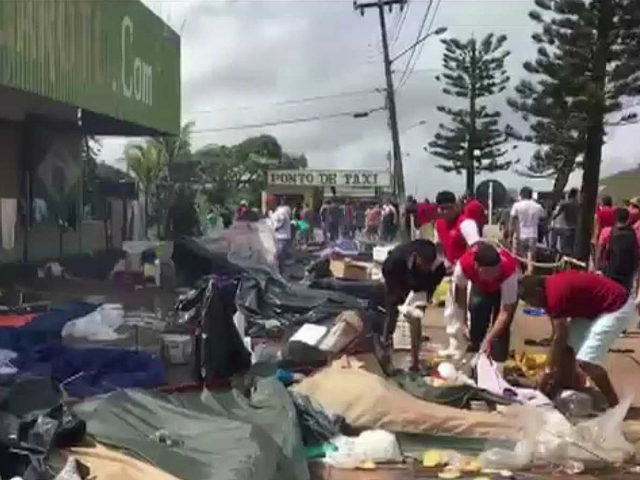The federal government in Brazil demanded on Sunday that the border state of Roraima allow the military to deploy in defense of Venezuelan refugees in the state following a mob attack in which locals stoned refugees and burned their few belongings.
The demand triggered outraged among Roraima politicians, who insist they have demanded military aid to calm the situation in the remote location for months and received little response, according to Brazilian newspaper O Globo.
An estimated 1,200 Venezuelan refugees left Pacaraima city, Roraima, on Monday after attacks on Saturday, according to the newspaper. Both regional and federal authorities fear, however, that violence will escalate as the refugees attempt to find homes in new towns and encounter populations who will see them as a threat to their communities.
According to Brazil’s Folha de Sao Paulo, the violence began following the assault and robbery of a local businessman in Pacaraima identified as Raimundo Nonato, who reportedly remains hospitalized.
Locals began accusing Venezuelan refugees of the crime and began spreading the word through hearsay on WhatsApp. “After a rally held to protest the attack against the storeowner, groups of residents roamed the town hurling rocks at the immigrants and setting fire to their belongings,” the Associated Press notes.
Those participating in the mob attack demanded that the Venezuelans return home, where socialism has caused a total collapse in the health care system and the average person does not have access to three meals a day. Some did turn back, fleeing the violence, while others simply left Pacaraima looking for another safe place to establish themselves.
Speaking to Folha on Sunday, one of the victims of the attack, Yineth Manzol — a 26-year-old mother of three daughters — said she lost everything in the bonfire made of the Venezuelans’ belongings, including the documents that allowed them to travel.
“They grabbed the children and attacked us. They beat the parents. They threw rocks, tiles, they hit us on the head,” she recounted. “They took our food and kicked us out as if we were dogs.”
Manzol says she is not sure where to go to keep her children safe, especially since, without documents, she now has no way to prove that her presence in Brazil is legal.
The riot finally ended after local border patrol troops intervened and fired warning shots to dispel the crowd. In the aftermath, Brazil’s President Michel Temer called an emergency meeting in Brasilia, which appears to have done little more than trigger a political scuffle between Brasilia and Roraima.
Brasilia announced the deployment of 120 National Guard forces and 36 health professionals to Pacaraima on Sunday, according to O Globo, issuing a statement that appeared to blame local Roraima government for the lack of military presence in the state.
“The government continues prepared to dispatch Armed Forces to guarantee law and order in Roraima. By force of law, such an initiative depends on the express solicitation of the governor of the state,” the presidential palace asserted. As O Globo explains, “the statement generated protests from the Roraima government, which insists it has solicited the presence of soldiers on numerous occasions.”
Roraima began demanding more military aid in January 2017 following an unrelated string of prison riots throughout the state. Gang warfare between Brazil’s two largest drug trafficking operations, the First Capital Command (PCC) and the Red Command (CV), resulted in gruesome riots in which inmates beheaded each other, cut each other’s hearts out, and “barbecued” the bodies of those killed.
Roraima’s location deep in the Amazon rain forest makes it an ideal location for drug trafficking as well as illegal border crossings. Roraima Governor Suely Campos demanded a military intervention in the state yet again in August, citing the deluge of Venezuelan refugees entering her already troubled state.
The Associated Press notes that most of the stress on the Brazilian state triggered by the Venezuelan migrant crisis — which has expelled millions from the nation — falls on Roraima, as it borders Venezuela’s Amazonas state. An estimated 50,000 Venezuelans have descended on the state, compared to the little more than half a million Brazilians who already lived there.
The incident is the latest, but far from the only one, of its kind in the state. A similar incident occurred in March in the town of Mucajaí, where a mob of Brazilian locals stormed an abandoned school known to house Venezuelan refugees and set fire to their belongings. They also ensured to render any food the Venezuelans were keeping useless, for example, by emptying bags of flour onto the floor. The attack was prompted by rumors that a Venezuelan refugee was behind the murder of a local.

COMMENTS
Please let us know if you're having issues with commenting.